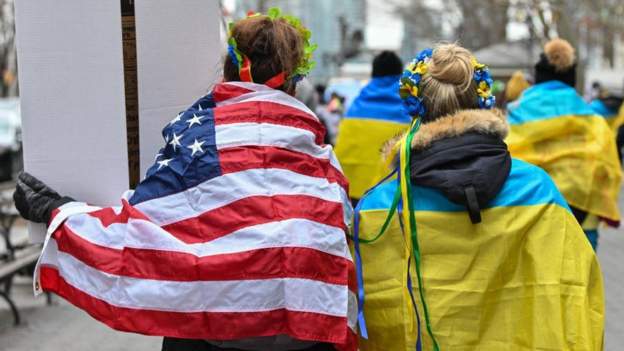Russia’s invasion of Ukraine has united the West, the conflict throwing its values into sharp focus. But when it comes to the next phase of the conflict, how long will that unity last? Here are five issues that could ultimately divide the Western alliance.
War aims
Before the war, liberal democracies appeared at times uncertain of their focus and future. Some questioned their alliances, while others succumbed to nationalist sentiment. But the conflict has reminded the West of what it represents – freedom, sovereignty and the rule of law. This in turn has produced a united response to Russia’s aggression.
But despite all the diplomacy by the UN Secretary General Antonio Guterres and others, this war may go on for some time. Might we be at the high watermark of consensus within the Western alliance? There are some tough choices ahead that may make it hard for Western powers to stay on the same diplomatic page.
Perhaps the most important tensions could come over the aims of the war. At the moment the West is united behind the defence of Ukraine. It is providing economic and military support to help the country resist.
But what is the longer-term aim? A cessation of hostilities, of course. But must Russia be defeated? Must Ukraine win? What would defeat and victory look like in practical terms? UK Prime Minister Boris Johnson told MPs last week: “We must simply do everything we can collectively to ensure that Vladimir Putin fails, and fails comprehensively.”
But what does “fail” mean? Mr Johnson did not say. One thing he did reject was pushing for regime change in Moscow. “It is very important… that we do not make it an objective to remove the Russian leader or to change politics in Russia,” he said. “This is about protecting the people of Ukraine. Putin will try to frame it as a struggle between him and the West, but we cannot accept that.”
Yet that is increasingly what the United States is doing. The US Defence Secretary Lloyd Austin has suggested it would not be enough simply to defeat Russian forces. “We want to see Russia weakened to the degree that it can’t do the kinds of things that it has done in invading Ukraine,” he said.
That could mean targeting sanctions on Russia’s defence sector. Or it could mean giving Ukraine the means to destroy a significant part of Russia’s military forces. Either way, not all Western allies may share such ambitions, fearing Putin might exploit the rhetoric to claim the West was indeed posing an existential threat to Russia.
Military support for Ukraine
The West is largely united in supporting Ukraine militarily. But it differs over specifics. Some countries are reluctant to provide heavy weaponry, fearing it could prolong the bloodshed. Others are increasing their deliveries of ammunition and more powerful weapons.
Tobias Ellwood, the Defence Select Committee chairman, wants Britain to give more. “We are doing enough to prevent Ukraine from losing but not enough to ensure they win,” he told BBC Radio 4’s Today programme. “We need to help Ukraine absolutely win rather than just defend the current lines.”
Note how he links talk of the means to a debate about the ends.
But others in the West may fear turning the defence of Ukraine into a full proxy war with Russia could push Putin in escalating the conflict, either by attacking other Western targets, launching cyber-attacks or even using weapons of mass destruction.
Not for nothing did Russia’s foreign minister, Sergei Lavrov, warn of the “serious and real” risk of nuclear war.
Support for political settlement
At some point, there may be a military stalemate and pressure may grow for a political settlement. The overwhelming assumption is the West will back whatever Ukraine chooses to do. But what if that is not the case?
What if some Western countries put pressure on Ukraine to sue for peace but the leadership in Kyiv wants to keep fighting? Might some countries start limiting their military support for Ukraine? Or alternatively, what if Ukraine agrees a political settlement the West opposes, thinking it rewards Russia too much? Might some countries refuse to lift sanctions on Russia and potentially scupper a peace deal?
There is a critical debate taking place among Western policymakers about what kind of political settlement could be agreed in Ukraine. Will the priority be regaining control of territory seized by Russia – or ensuring the future security, integrity and viability of what is left of Ukraine after the fighting stops?
A senior western official revealed this tension in almost the same breath. “Putin cannot be seen to have successfully adjusted the sovereign boundaries of Ukraine by force,” he said, before adding, “Our long-term plan for Ukraine is that it succeeds as a sovereign and independent state.” Those two objectives are not necessarily the same thing.
In practical terms, this means there will be tough choices when it comes to agreeing a political settlement. Should, for example, the West push for Russian forces to withdraw fully to pre-February 2022 borders or leave just some of the areas they have occupied?
For Ben Wallace, the UK Defence Secretary, neither option would be enough. “For my part, I want Putin not only beyond the pre-February boundaries,” he told MPs. “He invaded Crimea illegally, he invaded Donetsk illegally and he should comply with international law and in the long run leave Ukraine.”
That may not be a view shared by others in the West.
Energy sanctions on Russia
Western powers could fall out over sanctions. For now, they have agreed to disagree over how hard to punish Russia, especially whether more sanctions should be imposed on its oil and gas exports.
Countries dependent on Russian energy say their economies could not survive without it. But if the fighting continues for some time, there may be counter pressures. Some countries might want to increase sanctions on Moscow to try to end the stalemate. Others might want to reduce energy sanctions as their own populations become less tolerant of the economic cost.
Ukraine’s future
It is equally possible for the West to disagree over Ukraine’s longer-term future. What happens if there are divisions within Ukraine? What if factions emerge, such as nationalists who want to continue fighting, and compromisers who want to agree a deal? Would the West have to take sides?
How bitter might the divisions be within Ukraine? Some analysts have even speculated about the possibility of civil war, making comparisons to the divisions within Ireland in 1922.
Or what if Ukraine began making policy choices the West might oppose?
Fiona Hill, the Russia expert and former US National Security Council official, has suggested Ukraine might even seek to own a nuclear weapon to ensure its future security.
“The more Putin keeps putting nuclear weapons out there… it’s just more pressure on countries like Ukraine to think the only real way for defence is to rush out and get a nuclear weapon,” she told a seminar at the Changing Europe think tank.
Would, in such circumstances, the West be willing to provide Ukraine with conventional weapons? Or even consider its possible membership of the European Union?
The point is that policy positions in conflict are rarely static and it may be wrong to assume Western unity will automatically sustain through the challenges ahead.



